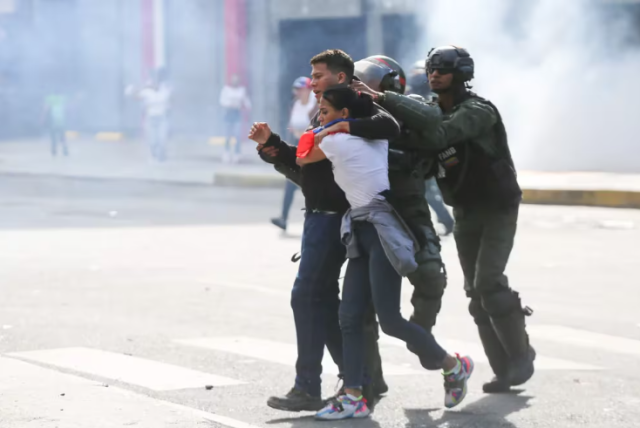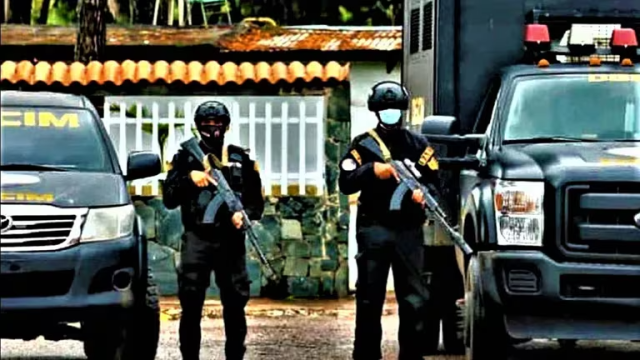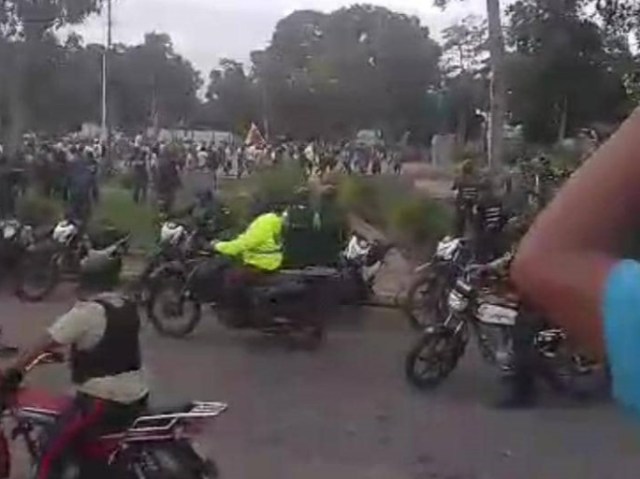
After the presidential elections in Venezuela on July 28th, politically motivated arrests have increased, not only against ordinary Venezuelans and political leaders who were linked to the campaign of Edmundo González Urrutia, but also against local authorities who identify with the opposition.
By lapatilla.com
So far this year, at least eight opposition mayors, elected in 2021, are no longer in office due to political reasons, either because they were arrested or had to go into exile after the widespread persecution of the democratic opposition.
On October 1st, in Zulia State, Mayor Rafael Ramírez was arrested at the premises of the Maracaibo Mayor’s Office along with other municipal officials, because political actors from the ruling party reported alleged acts of corruption in the administration of the local opposition leader.
Ten days after this arbitrary incident, Adrián Romero was appointed mayor of the city for a period of 90 days, until the outcome of Ramírez’s legal situation is ascertained.
The substitute municipal authority of Maracaibo already announced the appointment of new directors, after the arrest of the four previous officeholders. The Human Talent Directorate will be assumed by José Molina, since the person in charge of this office, Diana Berrios, was arrested. The new Director of Citizen Security will be Aldryn José Parra, replacing David Barroso, who was also arrested along with Mayor Rafael Ramírez. Mayerlin Morales will take over as Chief of the Office of the Secretary of State from Margarita Asanza, who is also under arrest. The Office of the Secretary of State will be occupied by Misael Medina, replacing Pedro Guanipa, who was arrested on September 26th.
Another case that occurred in Zulia occurred on July 31st, when the Mayor of Lagunillas, José Mosquera Adarme, was arrested. He was then transferred to the DGCIM (General Directorate of Military Intelligence) headquarters in Caracas and was released on August 6th.
The most recent arrest in Zulia occurred on October 18th, when the Bolivarian Police of the region proceeded to arbitrarily arrest lawyer Eduardo Labrador, legislator of the Legislative Council of the state, leader of ‘Zulia Humana’ and professor and researcher at the University of Zulia (LUZ). At the time of writing this report, his family did not know Labrador’s whereabouts.
Do not talk about July 28th
Added to this list is the arrest of the Mayor of Rangel, Abraham Hayón Crochón, in the state of Mérida, as confirmed on September 4th by the Minister of the Interior, Justice and Peace, Diosdado Cabello, in his program ‘Con el Mazo Dando’ broadcast by the state TV channel Venezolana de Televisión (VTV).
The arrest took place after a video was published on the Instagram account of the Mayor of Rangel on August 16th, where Hayón Crochón reflects on the current political situation in Venezuela, questions the electoral results released by the CNE and asks the US to “intervene in a humanitarian action” to “protect peace” in Venezuela.

After this, Minister Cabello pointed out that “asking for a military intervention by foreign forces against the nation where one was born is treason and, although I am not a judge, the least that should come out is 30 years in prison so that he respects his own country,” he stated.
Currently, Godelia Ramírez is the acting mayor.
In the state of Trujillo, the arrest of the Mayor of the Urdaneta municipality, José Leocadio Carrillo, was also reported last Saturday, August 17th. However, he was released the day after his arrest. Additionally, Carrillo was politically disqualified by the Comptroller’s Office last June. The measure allows him to continue in office until 2025, but he will not be able to run for any post in a future election.
Authorities intercepted by security forces
On August 17th, the Deputy to the Legislative Council of the state of Carabobo (Clec) for the ‘Unidad’ democratic group and regional organization secretary of ‘Un Nuevo Tiempo’, Carlos Molina, was arrested after being intercepted by state security officials when leaving an opposition rally in Valencia.
In addition, on August 2nd at night it was learned that allegedly officials from the General Directorate of Military Counterintelligence (Dgcim) intercepted Vicente Scarano Brandonisio, general coordinator of the San Diego Mayor’s Office, in Prebo, northern neighborhood of Valencia. It should be noted that Vicente Scarano is also the son of the former mayor of San Diego, Enzo Scarano, and the former mayor of that jurisdiction, Rosa Brandonisio de Scarano.
In the state of Sucre, the Mayor’s Office of the Mejía municipality confirmed through a statement the arrest of Mayor Jordán Sifuentes. According to the letter, his capture occurred on the afternoon of Friday, August 2nd, when he was intercepted in his vehicle on the Anzoátegui-Sucre national highway.

Previously, on July 30th, unidentified individuals also tried to capture Mayor Sifuentes, when they stopped his vehicle and took it to the headquarters of the GNB, but the mayor was not in the car.
Euclides Colón, who was an official at the mayor’s office, is the current acting mayor.
In the state of Cojedes, the mayor of Tinaquillo, Fernando Feo, was arrested on August 4th. Feo is a member of ‘Acción Democrática’ another opposition party.
Also, on August 1st, security officials tried to arrest the mayor of the Sucre municipality, in the state of Portuguesa, Jóbito Villegas, but the community prevented this police action from being carried out. The Mayor continues to exercise his functions.
Exile after persecution
In Lara State, the persecution and intimidation by Nicolás Maduro regime against the mayor of the Torres municipality, Javier Oropeza, led him to forced exile.
He, among other alleged crimes, is accused of omission and is held responsible for all the different violent events recorded in Carora in the days after the elections. The directors of the mayor’s office and two councilors of the opposition faction of the Municipal Chamber of Torres are also being accused, so his entire government cabinet is in hiding.
Oropeza said that once he learned of these false accusations, he had to go underground until he left the country. While this was happening, his home and other properties were raided.

In addition, on August 8th, he informed that the director of open government, Endrick Medina, was arrested when he was leaving the Municipal Palace.
In the midst of the temporary absence, Javier Oropeza appointed Iraida Timaure as the acting mayor of the municipality, and in order to be able to give effect to the decree, it had to be published in the Official Gazette, whose office is governed by the Municipal Council, which is majority pro-government. This body did not publish the decree, so the administrative litigation admitted the appeal in their favor (the pro-government bench), and in less than the 15 days required, they appointed Lasmit Verde as acting mayor.
Another mayor who was the victim of harassment, persecution and an attempted arrest on June 28th, which was prevented by his constituents, was Franco Gerratana, representative of the Ortiz municipality of the state of Guárico. Since July 3rd, he has had an arrest warrant that has not been executed. His whereabouts are currently unknown. A PSUV councilor, Ali Matute, is the current acting mayor.
Low-profile mayors
In Táchira, political persecution began weeks before the July 28th election, after a group of opposition mayors held a meeting in the city of Caracas with Edmundo González, to whom they expressed their support during his presidential run. However, this support did not materialize, since one of them, Yonnhy Liscano, mayor of the Ayacucho municipality, who is accused of alleged cases of corruption and was ‘deprived of liberty’ (euphemism for imprisonment) on June 20th when he was traveling with his wife and sister-in-law in a van back to his jurisdiction.
Likewise, a few hours after Liscano’s arrest, an arrest warrant was issued against Rigoberto Ovallos, Mayor of the Antonio Rómulo Costa municipality, for alleged “intentional embezzlement and evasion of tenders,” which is why Ovallos apparently fled to Colombian territory.
This situation generated fear in the rest of the mayors of Táchira who had promised to support Edmundo González, so on July 28th the great majority of the municipal authorities were not in their localities, many of them crossed the border and waited for the ‘storm’ to pass for fear of reprisals.

Since then, the opposition mayors in Táchira have kept a low profile and have not filed complaints about the budget crisis, as well as the deficiencies in public services that affect their municipalities.
It should be noted that last Friday, October 11th, Mayor Yonnhy Liscano, who is being held in the Division Against Organized Crime (DCDO), was transferred to the Social Security Hospital in San Cristóbal, because he had suffered precordial pain and a severe headache.
Likewise, Liscano celebrated his birthday behind bars on Monday, October 14th, and through social networks, the displays of affection from his family, employees of the mayor’s office and merchants of the municipality, who await his prompt release, were public and noticeable.
Disqualifications
In the months leading up to the presidential elections on July 28th, at least 12 opposition mayors were disqualified by the Comptroller General.
The measure allows them to continue in their positions until 2025. Afterwards, they will not be able to hold public office for a certain period of time.
The first two cases occurred last April, with the disqualification of the mayors of Miranda State, José Fernández López (Los Salias) and Elías Sayegh (El Hatillo).
Then, in June, eight local leaders of the state of Trujillo and two of Nueva Esparta, learned that they had been sanctioned for 15 years by the agency in charge of ensuring the proper use of public funds.
The NGO Access to Justice indicated in a publication on its website that several of those sanctioned with political disqualification assured that they learned of the measure against them through the website of the National Electoral Council (CNE) and not because they had been notified by the Comptroller’s Office.

The mayors disqualified in Trujillo are: Heriberto Materán Tapia, Motatán municipality; José Leocadio Carrillo, Urdaneta municipality; Dilcia Rojas de Oviedo, Campo Elías municipality; Keiver Peña, Sucre municipality; Servando Godoy, Márquez Cañizales municipality; Wilmer Delgado, Monte Carmelo municipality; Yohanthi Domínguez, Carache municipality; and Francisco Aguilar, Andrés Bello municipality. In the case of Nueva Esparta, the measure is directed against Iraima Vásquez, Tubores municipality; and José María Fermín, Villalba municipality.
Six days before the presidential elections, on July 22nd, the mayors of Trujillo, Rojas, Delgado, Materán, Aguilar and Godoy, declared themselves “independent” and expressed their support for Nicolás Maduro.
Dismissals
Following a visit by the opposition leader, María Corina Machado, to the state of Delta Amacuro, two opposition councillors from Tucupita were dismissed by the ruling majority of the Municipal Chamber on June 20th. Councillors Lenin Ortiz and Orelys Jaimez reported that they were prevented from entering the legislature.
In another incident, on August 7th, the councillor of the Freites municipality in the state of Anzoátegui, Beatriz Andrade, was arrested. On August 12th, she was deprived of her liberty (indicted) during the telematic hearing before the Third Court with jurisdiction over Terrorism in Caracas.

Likewise, a week before Andrade’s arrest, Attorney General Tarek William Saab had announced an arrest warrant against another councilor of the Freites municipality, José Franco Salazar, for the alleged commission of the crimes of incitement to hatred, association and terrorism.
It was learned that two other councilors in Puerto La Cruz, Roger Millán and Antonio Acosta, remain in custody.
Tactics of Chavismo
For the lawyer and political consultant, Andrés Silva, these arrests lack transparency. In his opinion, with these strategies the national government intends to show that they are “strong, united and prepared” to reach January 10, 2025.
However, he believes that the Executive is laying the foundations for a new international isolation.
“When January 10th arrives and governments have to take a position on whether or not to recognize the Government of Venezuela, as these arrests continue to increase, and this great lack of transparency stains all the processes that the Government is carrying out in the processes of arrests, in the electoral process (…) That is to say, everything that they are doing, despite announcing it, they are doing it with the utmost opacity and what that will achieve is that the governments of the international community will find it increasingly difficult, not only to show support for the government of Nicolás Maduro, but rather they will find it increasingly difficult to take a position of neutrality (…) These governments will have to choose between their own political survival and ignoring the government of Maduro or to continue insisting that there be greater transparency in the processes,” explained the lawyer and political consultant.

He considered that these actions by the administration of Nicolás Maduro seek to discourage Venezuelan citizens from actively participating in the upcoming electoral processes. Such is the case of the regional, municipal and legislative elections scheduled for next year. In addition, they are intended to increase the fear and paranoia that some Venezuelans feel in the midst of the current political situation.
“What Venezuelans are seeing is that when an opposition mayor, governor, deputy or councilor is elected, there are an infinite number of obstacles to exercising public office, to the point that today mayors seem more like janitors than mayors, because the only responsibilities that they are allowed to carry out in peace are the management of culture and green areas, what will happen is that Venezuelans are going to say: “Even if I defend my vote and my mayor is elected, what can happen is that in two years he will no longer be my mayor and they will put him in jail, and they will put a new one in my place and this cycle will continue,” said Silva.
He said that currently the country remains in a “highly tense” calm, which has multiplied with the advance of Christmas, but where at the same time Venezuelans in their daily lives have also observed an increase in the presence of police and security forces on the streets.

